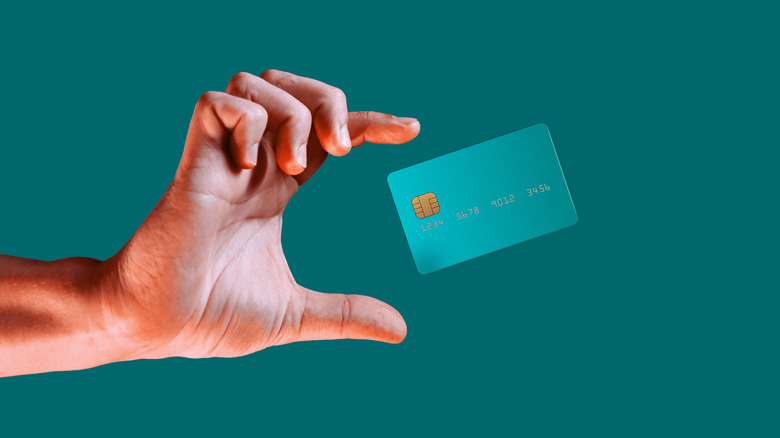Things You Should Never Do During A Doctor's Appointment
You're at your annual checkup and are giving your insurance information to a new member of the medical staff. Since you're feeling tense, you decide to make some small talk to try to settle your nerves. However, this person is coldly professional and even a bit short with you. Already on edge, you lose your temper and yell at them, using words that would get you bleeped on television.
Going to the doctor can be very stressful, especially if you're not feeling your best. But like most places, there are certain etiquettes to follow — at least if you want to have a productive, successful appointment. And, well, cursing out any member of the medical team is definitely a no-no even if you're displeased with them (via Healthline). In the above example, a better approach would be to calmly let this medical professional know that you are feeling nervous and that the way they are behaving towards you is making you feel worse. Or you can let the doctor know in private what happened or write a letter or email to the office.
While not insulting or being cruel towards someone is obviously good manners, there's a number of don'ts for doctor's appointments that are easy to forget. Is it more polite to avoid these pitfalls? In some cases, yes, but in others, it's more about you getting the most out of your visit.
Don't rely solely on your memory
Have you ever played a trivia game and totally blanked on a question you certainly knew the answer to? It's frustrating but understandable, especially if you've only got so many minutes (or seconds) to give your answer. And while a doctor's appointment isn't quite as fun as game night, it's easy to momentarily forget important pieces of information about your health. Fortunately, there's an easy way to avoid this problem.
Rather than hoping your memory doesn't fail you — a definite don't at a doctor's appointment — bring a concise list of everything you want to speak to your doctor about during your visit, beginning with any new health concerns (via Self). This way even if your nerves really get the better of you, you can still hand your doctor your list.
And Dr. John Wasson, a researcher with the Dartmouth Institute for Health Policy and Clinical Practice in New Hampshire, has one more tip: Prioritize what is worrying you the most about your health (via Self). Over the years, he has learned to ask patients if there is anything else besides what is on their lists in case they've left something out. "If I don't do that, I risk the hand on the doorknob," he told Self, referring to a phenomenon in which the patient waits until the doctor is leaving to tell them something crucial, potentially causing problems all-around.
Don't walk in with a self-diagnosis
The internet can be a wonderful source of information, so it's natural to look up symptoms when you're not feeling well. However, there's one important fact to keep in mind: Doctors have years of training and firsthand experience. So there are serious pitfalls to trying to self-diagnose.
As Dr. Suzanne Steinbaum, director of women's heart health at New York's Lenox Hill Hospital, told Prevention, reading all the possible causes for certain symptoms can be unnecessarily frightening. Plus, you want to give your doctor a chance to methodically examine you, as well as take into consideration factors outside of your symptoms like family history. By self-diagnosing, you could be complicating matters rather than zeroing in on a solution. Does that mean you shouldn't do any online research? No, of course not, but you still want to go into your appointment with an open mind and let your doctor follow their protocol. Once they've finished, you can ask questions about your research in relationship to your possible diagnosis.
Another self-diagnosis trap patients fall into is chalking up their symptoms to specific factors in their life like stress (via Prevention). Dr. Steinbaum cautions that using phrases like "it's probably just stress" or "it might just be in my head" can make your symptoms sound less serious, which could lead to additional medical problems. Once again, tell your doctor what you're experiencing, let them examine you, and then ask about possible factors like stress.
Don't avoid asking and answering uncomfortable questions
From how often you use the bathroom to details about the skeletons in your family tree's closet, doctor's appointments can mean answering very personal questions. And while it's okay to feel awkward, leaving out information about yourself and your family's history could be harmful to your health.
As the Cleveland Clinic explained, "Your family history is a very important tool for predicting your risk factor for many diseases and conditions." It's not easy talking about topics like relatives with mental illness or an addiction to alcohol. But not being open and honest about such things means your doctor can't advise you about matters such as how likely you are to follow in their footsteps and the odds of you passing along certain genes to your children.
Besides family history, a person may feel uneasy talking to the doctor about very intimate aspects of their life because they are afraid that they will be judged. For example, Self magazine addressed how patients are often uncomfortable talking about sexually transmitted diseases. However, as Dr. Matthew Goldman, a specialist at the Cleveland Clinic, told Self, "I encourage patients to gather information on the topic to gain insight on potential causes, testing, and treatment options." And as the Cleveland Clinic website states, "But you should not feel embarrassed or ashamed to talk about anything with your provider. (Trust us, providers have heard it all!)"
Don't leave out parts of your medical history
Imagine this: You show up for your doctor's appointment and are handed a medical form to fill out. As you go through the form, you notice questions like "Have you ever had surgery?" You wrack your brain: Does having your tonsils out as a child count? It was so long ago. And what about dental surgery, like wisdom teeth extraction? Flustered, you rush through these questions, knowing you're probably leaving out information.
We've all been in the above scenario, but as Dr. Caesar Djavaherian, chief medical officer at Carbon Health, told Insider, those questions are there for several good reasons. "First off, depending on the kind of surgery you've had, the possibility of having certain diseases increases," Djavaherian explained. "Another reason you shouldn't lie about your surgical history is that if you've had a previous complication with anesthesia administered during surgery, it's important to let your doctor know of this." And as Dr. Gaspere Geraci, a family physician at AmeriHealth Caritas, pointed out, while some surgeries aren't as invasive as others, any surgery could have a long-term impact on your health.
To avoid this, don't show up without a list detailing your medical history. Think of it as your cheat sheet for those forms. And if you're not sure about a question, don't be afraid to ask at the front desk. In all likelihood, you're not the first person to ask — and you won't be the last.
Don't stay quiet if you're concerned or confused
What would you do if your doctor said you had a case of xerosis and that you were experiencing paresthesia in your right lower appendage? Probably, you'd be worried until you learned that those are the medical terms for dry skin and your foot being asleep. Health and medicine can be complicated, so the worst thing you can do is not ask your doctor when you don't understand what they are telling you.
As Dr. Debra Roter, a professor at the Johns Hopkins Bloomberg School of Public Health, notes on the school's website, "Sometimes people are reluctant to ask questions. Ask your doctor to clarify what they're saying in plain language if they're talking in medical-speak." She also recommends repeating what the doctor told you to help you remember what they said and to ensure that you haven't misunderstood anything. You also may want to take some notes and even show them to your doctor before you leave.
In addition, don't be afraid to let your doctor know if you're worried about the possible side effects or risks of treatment. As Dr. Roter said, you should let the doctor know exactly what is troubling you so they can address your concerns. Roter continued, "A critical part of the conversation is saying to the doctor, 'I understand that all treatments have risks and benefits. Can you help me compare these to other treatments?'"
Don't forget to tell your doctor about your vitamins, supplements, and medications
Thanks to modern technology, it's much easier for a doctor to keep track of your prescriptions than it was just a handful of decades ago. However, just because something you're taking doesn't require a physician's signature doesn't mean it's not important especially when it comes to your doctor's appointment.
As the University of California San Francisco noted, you should let your doctor know about the over-the-counter medicines you take, like Tylenol (acetaminophen) or Advil (ibuprofen). You should also tell your doctor if you're taking vitamins, like riboflavin, and supplements, like iron. Even something as seemingly commonplace as antacids shouldn't be left out if you take them on a regular basis.
In addition to what you are taking, you should let your doctor know when you take something (morning, afternoon, evening), how often you take it (once a day, twice a day), and the dosage you're taking (50 milligrams, 100 milligrams), according to the university. Don't forget to either bring a list of everything you're taking or the bottles and containers with you just in case there's additional information your doctor needs for their notes. And don't waste this perfect segue to talk with your doctor about any concerns you have regarding what you take — including both long- and short-term side effects and health risks.
Don't make these telemedicine mistakes
There's no denying that telemedicine can have its advantages. If you're sick in bed and it's pouring rain outside, you no longer have to brave the elements and waste your energy just to see a doctor. But just because you're not inside a doctor's office, that doesn't mean there aren't some important problems to avoid.
If you're telemedicine appointment is over the computer like a Zoom call, you should make sure to be in a room where there's ample light (via Everyday Health). You also should have a flashlight handy just in case your doctor needs to, for example, see inside your mouth. Remember, one of the worst things you can do during a telemedicine doctor's appointment is create a situation where the doctor can't properly examine you. Not only can this mean you'll need to reschedule and possibly pay an additional copay, but you could also be misdiagnosed.
While doing an over-the-phone virtual doctor's appointment can be more convenient (no worries about clutter in the background), this type of telemedicine visit has a major pitfall: It's easy to become distracted, especially if you choose the wrong place to have it. As Dr. Rachel Bishop, the medical director of Houston Methodist Virtual Urgent Care, told Everyday Health, "I've had people try to do virtual urgent care visits while they're driving a car. We tell them to hang up and we'll reschedule later."
Don't leave your credit card behind
While it's crucial to have all medical cards and even a form of ID with you for a doctor's appointment, in some cases you will also need a form of payment. An article in The Washington Post details the experience of a mother whose daughter is asthmatic. When her daughter began having severe asthma symptoms, a doctor recommended taking her to five specialists. The receptionists at two of the five offices told her that they required a credit card number or there was no guarantee she could see the specialists. "Receptionists at those practices informed me that they would bill me upfront for a certain amount, which would be applied to any co-pay required at the time of my daughter's visit," she said. "Any unused amount would be refunded." In her case, one specialist charged her $40, and the other charged her $90.
While this mother's first encounter with a specialist's receptionist was over the phone, a doctor's office may still charge you a co-pay when you first show up for your appointment. For this reason, make sure you have your credit card, debit card, or at the very least enough cash to cover any possible costs. Otherwise, you may not be allowed to see the doctor even if you have an appointment and could be forced to reschedule your visit.
Don't bring someone with you that dominates your appointment
This is a bit of a tricky don't because it is related to a very useful do. Having someone with you at a doctor's appointment can be helpful. They can support you if you're nervous, or they can act as a translator if there's a language barrier. Aging expert Barbara Hannah Grufferman explained in an article for HuffPost that she goes with her mother and mother-in-law to their doctors' appointments. "They are 75 and 83, respectively, and a second set of ears and eyes is always a good thing, especially when the doctor is discussing procedures, medicine and follow-up recommendations," she wrote. However, Grufferman explained that she doesn't "completely take over" her relatives' appointments. In other words, if your friend or family member is doing too much talking — even if they have your best interests at heart — they can be disruptive; their presence can actually be counterproductive.
The key to turning this don't into a do is choosing someone who will listen more than talk. One possible solution is to ask them to take notes for you (via University of California San Francisco). This way they're focused on a specific helpful task. If you feel like you need someone to help you due to language or because of hearing issues, let your doctor's office know. They may be able to bring in an interpreter or another communication support services professional.
Don't lie about eating, drinking, and habits in general
Everyone indulges from time to time. But perhaps when you speak with your doctor, you're feeling a bit embarrassed that you had chocolate cake and wine three nights this week. Nevertheless, you shouldn't hide that information.
"Many patients don't want to admit the difficulties they have with complying with the prescribed diet, so it is easier for them to deny that they are eating anything 'bad,'" Dr. Tania Dempsey, an integrative doctor told Reader's Digest Australia. As Dr. Dempsey explains, if a patient claims to be sticking to a diet, and it doesn't seem to be working, she might try "more aggressive treatment options." But if the patient is honest, the doctor can address why they are having trouble with a particular diet and help them find a solution.
Besides eating habits, drinking and smoking can be difficult for a patient to be open about with their doctor. But not be truthful can have serious consequences. "Alcohol abuse can also cause patients to go through withdrawal during a hospitalization," neurosurgeon Dr. David Poulad told Reader's Digest. "Alcohol withdrawal can manifest with seizures and needs to be recognized in order to be treated appropriately." In addition, plastic surgeon Dr. Andrew Miller said medical professionals will recommend patients not undergo some surgeries if they are smokers due to how nicotine impacts the healing process. However, they can't make that recommendation if they are unaware that the person smokes.
Don't automatically dismiss your doctor's recommendations
Here is a scary static for you. Every year in the U.S., roughly 125,000 people die because they didn't take their medication as prescribed (via Verywell Health). Here's another sobering thought: "Nonadherence [to medication] has been estimated to cost the U.S. health care system between $100 billion and $289 billion annually," the Annals of Internal Medicine found in 2012.
Yes, doctors are human. Despite their training and expertise, they are fallible. But just dismissing their advice can be dangerous. This isn't to say that patients don't have good reasons for not wanting to do a particular course of treatment. Of course, the cost of some medicines can be a big factor, but so too can concerns about potential side effects and negative past experiences with similar treatments (via Verywell Health).
Although these are legitimate concerns, yessing your doctor to their face and then dismissing their advice or taking a lackadaisical approach to your treatments is the exact opposite of what you should do. If you have concerns about your treatment, talk to your doctor. This includes concerns about the cost. They may be able to make recommendations or prescribe a generic form of a drug that is within your price range. And if you've had negative experiences with a particular treatment, let them know. There may be other options that are just as effective without the same unpleasant side effects.
When it comes to pain, don't exaggerate or downplay how you feel
We all have those moments when we pretend something is not hurting us as much as it is or lose perspective and imagine a pimple as cancer. But when you see your doctor, you still need to be as precise as possible, especially if you're describing physical pain (via Healthline).
To illustrate, let's play a little word game. If someone told you that they are in "terrible pain," would you have any idea what was wrong? Now, what if that same person said that they were experiencing a "burning pain." Chances are you're eliminating some possible causes and zeroing in on other ones just because of that one-word change. The same premise applies to doctors. Choose your descriptions carefully because there's a world of difference between a dull ache and a sharp, stabbing sensation (via Healthline).
Of course, you can also describe physical discomfort using the pain scale approach, but make sure your doctor knows which end of the scale represents no pain and which represents severe pain (via Healthline). And finally, don't just say a particular pain is "ruining my life." Again, be specific; explain how it is interfering with your day-to-day life. Is it making you unable to think? Or is it difficult to get from point A to point B because of pain in one part of your body? Every detail may be a clue that your doctor can use to help you.
Don't be inconsiderate to others in the waiting room
Picture this scene: A man is in a waiting room, feeling nervous about his appointment. It seems like he's been sitting there forever, which is not helping those butterflies in his stomach settle down. Looking for a little distraction, he starts asking everyone else in the room why they are seeing the doctor today. If you're thinking this is not a good idea, you are absolutely right!
As Psychology Today explains, there are a number of don'ts while you're waiting to see your doctor. While small talk is usually seen as polite, there are many very private, potentially embarrassing reasons someone may be at a doctor's office. By asking them, you could be putting them on the spot and in front of a room full of strangers.
Other definite waiting room don'ts include making personal calls on your cellphone and eating foods that are messy, loud, and have a strong scent (via Psychology Today). You also should not leave trash behind, including any crumbs from waiting room-appropriate foods like energy bars. As Psychology Today explains, some doctors' offices have a cleaning service that comes in only once a week. And if you are a parent and need to bring your child or children with you during your doctor's visit, try to keep them occupied with, for example, a book.
Don't threaten your doctor with a bad online review
The internet can be a very empowering tool. However, as the Peter Parker principle goes, "With great power comes great responsibility." Threatening to use that power against your doctor is not the right way to handle an appointment that is not going the way you want.
"Doctors are also seeing an increase in threats, as bad reviews are turning into patients' weapon of choice," Dr. Dana Corriel, a New York internist, told Healthline. "They can be used to leverage antibiotics, and even controlled substances, and a physician who practices in today's day and age must think twice before telling a patient 'no.'" Plus, as Dr. Corriel pointed out, anyone can post any kind of comment about a doctor online without proof that what they are saying (both good and bad) is true.
Now, to be clear, if your doctor does something during an appointment that you feel is wrong, you have the right to go online and leave an honest review (via Healthline). However, a more productive approach may be to calmly talk to them, using "I" rather than "you" statements. In some cases, you may find that your doctor didn't realize what they did to upset you and they might change their approach, making future visits more pleasant.















